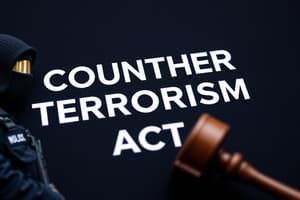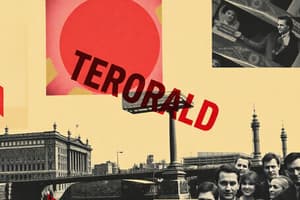Podcast
Questions and Answers
What is required for a person to designate a cordoned area under the Terrorism Act 2000?
What is required for a person to designate a cordoned area under the Terrorism Act 2000?
- Confirmation of a terrorist act
- Approval from a judge
- Consideration that it is expedient for a terrorist investigation (correct)
- Written consent from the public
Who has the authority to designate a cordoned area in Northern Ireland under Section 34?
Who has the authority to designate a cordoned area in Northern Ireland under Section 34?
- A member of the PSNI of at least the rank of superintendent (correct)
- A constable of any rank if there is urgency
- Any police constable
- A police officer trained in investigative skills
What must be done if a cordoned area is designated orally?
What must be done if a cordoned area is designated orally?
- It must be confirmed in writing as soon as practicable. (correct)
- It must be recorded in the police logs immediately.
- It must be reported to the Home Office.
- It is sufficient and does not need further confirmation.
How should the cordoned area be visually indicated according to the legislation?
How should the cordoned area be visually indicated according to the legislation?
What legislation should be revisited prior to attending the police lesson on cordons?
What legislation should be revisited prior to attending the police lesson on cordons?
What area is designated as 'cordoned' during a terrorist investigation?
What area is designated as 'cordoned' during a terrorist investigation?
What should a constable do if they consider it necessary to designate a cordoned area due to urgency?
What should a constable do if they consider it necessary to designate a cordoned area due to urgency?
What is the primary purpose of a cordoned area during an investigation?
What is the primary purpose of a cordoned area during an investigation?
What must a constable do immediately after making a designation?
What must a constable do immediately after making a designation?
What happens if a superintendent cancels a designation?
What happens if a superintendent cancels a designation?
Which of the following actions is NOT permitted for a constable in a cordoned area?
Which of the following actions is NOT permitted for a constable in a cordoned area?
What must be marked out in the cordoned area?
What must be marked out in the cordoned area?
What is the consequence of failing to comply with an order in a cordoned area?
What is the consequence of failing to comply with an order in a cordoned area?
In matters of urgency, who can designate an area?
In matters of urgency, who can designate an area?
According to the guidelines, who should a constable inform after making a designation?
According to the guidelines, who should a constable inform after making a designation?
What is the liability for a person guilty of an offence under subsection (2)?
What is the liability for a person guilty of an offence under subsection (2)?
What is the maximum imprisonment term under the Act?
What is the maximum imprisonment term under the Act?
What level of fines is the maximum under this Act?
What level of fines is the maximum under this Act?
Under what conditions can a constable enter a building without written authorisation?
Under what conditions can a constable enter a building without written authorisation?
Who must provide the written authorisation for a constable to enter a premises?
Who must provide the written authorisation for a constable to enter a premises?
What must a constable do as soon as is reasonably practicable after entering a building?
What must a constable do as soon as is reasonably practicable after entering a building?
What is one type of authorisation that is considered valid under this Act?
What is one type of authorisation that is considered valid under this Act?
What type of power can a constable exercise in accordance with this Act?
What type of power can a constable exercise in accordance with this Act?
Which of the following is NOT a requirement for entering a premises as stated in the Act?
Which of the following is NOT a requirement for entering a premises as stated in the Act?
Flashcards are hidden until you start studying
Study Notes
Terrorism Act 2000
- The Terrorism Act 2000 outlines the legal framework for designating cordoned areas in relation to terrorist investigations.
- Section 33: Allows the designation of a cordoned area if it's deemed expedient for the purposes of a terrorist investigation.
- The designation can be made orally but must be subsequently confirmed in writing.
- The cordoned area must be demarcated using tape marked with the word "police" or another suitable method.
- Section 34: Details the ranking of officers authorized to designate a cordoned area.
- A superintendent can make a designation in writing.
- In urgent situations, a constable can make the designation and must subsequently inform a superintendent.
- Section 36: Outlines the powers of a constable within a cordoned area.
- A constable in uniform can order a person in the cordoned area to leave, order the removal of vehicles, and restrict access.
- Failure to comply with these orders is an offence.
- Section 36 (4): Establishes penalties for non-compliance with cordon orders, including imprisonment or fines.
- Section 114: Explains that powers granted under the Terrorism Act are additional to common law and other enactments.
- Constables can use reasonable force to exercise their powers, except for specific exceptions in Schedule 7.
Justice and Security Act (NI) 2007
- Section 23: Provides for the power of entry into premises by members of Her Majesty's forces or a constable.
- The entry is permitted for preserving peace or maintaining order.
- A Constable requires authorisation from a superintendent or inspector, except in cases of urgency.
- Written authorisation applies to a specific geographical area in Northern Ireland.
- Oral authorisation must be recorded in writing as soon as reasonably practicable.
- A record should be made of the entry, including the address, location, date, time, purpose, and police numbers involved.
Studying That Suits You
Use AI to generate personalized quizzes and flashcards to suit your learning preferences.




